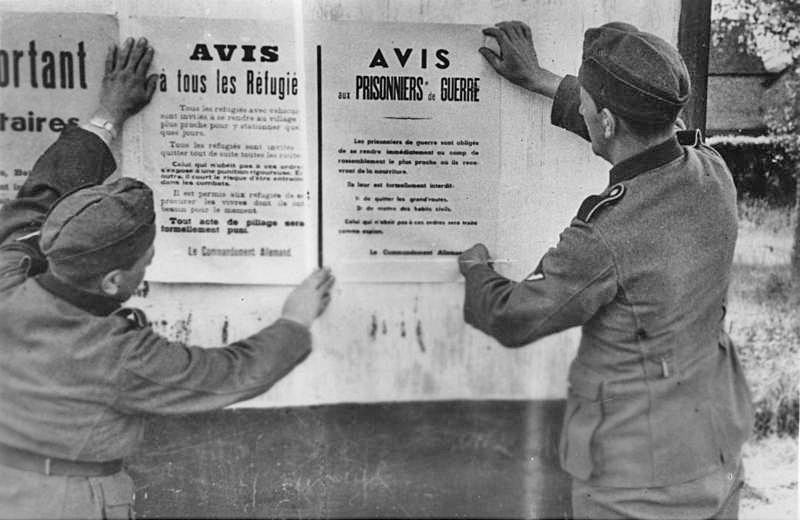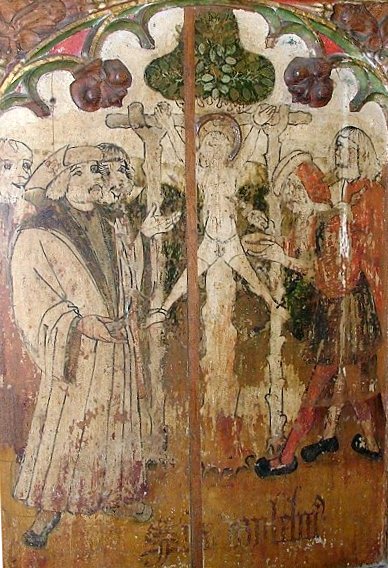|
Camp De Noé
Camp de Noé was in 14 hectare internment camp straddling the municipalities of Noé, Le Fauga and Mauzac, south of Toulouse (Haute-Garonne). It should not be confused with the Mauzac detention camp in the Dordogne. History This camp was created in 1941 by the French Ministry of War to hold Spanish Republicans and Jews under Vichy France's anti-Semitic laws. The camp occupied about 14 hectares to the north of Noé where about 2,500 foreigners, about half Jews and half Spanish were held here from February 1941 until July 1942. The camp was liberated by the Maquis on 19 August 1944 and was then used for the internment of collaborators, but with the same guards. It finally closed in 1947. People who passed through the camp * Alexander Grothendieck * Henri Caillavet * Jules Saliège * Francesco Fausto Nitti Bibliography * Éric Malo, ''Les Camps d'internement du Midi de la France'', Municipal Library of Toulouse, 1990 * Denis Peschanski, ''Les Camps d'internement en ... [...More Info...] [...Related Items...] OR: [Wikipedia] [Google] [Baidu] |
Noé, Haute-Garonne
Noé (; oc, Noèr) is a commune in the Haute-Garonne department, Southwestern France. Population Transport * Gare de Longages-Noé See also *Communes of the Haute-Garonne department The following is a list of the 586 communes of the French department of Haute-Garonne. The communes cooperate in the following intercommunalities (as of 2020):Communes of Haute-Garonne {{HauteGaronne-geo-stub ... [...More Info...] [...Related Items...] OR: [Wikipedia] [Google] [Baidu] |
Collaborationism
Wartime collaboration is cooperation with the enemy against one's country of citizenship in wartime, and in the words of historian Gerhard Hirschfeld, "is as old as war and the occupation of foreign territory". The term ''collaborator'' dates to the 19th century and was used in France during the Napoleonic Wars. The meaning shifted during World War II to designate traitorous collaboration with the enemy. The related term ''collaborationism'' is used by historians restricted to a subset of wartime collaborators in Vichy France who actively promoted German victory. Etymology The term ''collaborate'' dates from 1871, and is a back-formation from collaborator (1802), from the French ''collaborateur'' as used during the Napoleonic Wars against smugglers trading with England and assisting in the escape of monarchists, and is itself derived from the Latin ''collaboratus'', past participle of ''collaborare'' "work with", from ''com''- "with" + ''labore'' "to work". The meaning of "traitoro ... [...More Info...] [...Related Items...] OR: [Wikipedia] [Google] [Baidu] |
World War II Concentration Camps
In its most general sense, the term "world" refers to the totality of entities, to the whole of reality or to everything that is. The nature of the world has been conceptualized differently in different fields. Some conceptions see the world as unique while others talk of a "plurality of worlds". Some treat the world as one simple object while others analyze the world as a complex made up of many parts. In ''scientific cosmology'' the world or universe is commonly defined as " e totality of all space and time; all that is, has been, and will be". '' Theories of modality'', on the other hand, talk of possible worlds as complete and consistent ways how things could have been. ''Phenomenology'', starting from the horizon of co-given objects present in the periphery of every experience, defines the world as the biggest horizon or the "horizon of all horizons". In ''philosophy of mind'', the world is commonly contrasted with the mind as that which is represented by the mind. ''Th ... [...More Info...] [...Related Items...] OR: [Wikipedia] [Google] [Baidu] |
Internment Camps In France
Numerous internment camps and concentration camps were located in France before, during and after World War II. Beside the camps created during World War I to intern German, Austrian and Ottoman civilian prisoners, the Third Republic (1871–1940) opened various internment camps for the Spanish refugees fleeing the Spanish Civil War (1936–1939). Following the prohibition of the French Communist Party (PCF) by the government of Édouard Daladier, they were used to detain communist political prisoners. The Third Republic also interned German anti-Nazis (mostly members of the Communist Party of Germany, KPD). Then, after the 10 July 1940 vote of full powers to Marshal Philippe Pétain and the proclamation of the '' État français'' (Vichy regime), these camps were used to intern Jews, Gypsies, and various political prisoners (anti-fascists from all countries). Vichy opened up so many camps that it became a full economic sector, to the extent that historian Maurice Rajsfus writes ... [...More Info...] [...Related Items...] OR: [Wikipedia] [Google] [Baidu] |
Fondation Pour La Mémoire De La Shoah
Fondation pour la Mémoire de la Shoah is a foundation that was formed in 2000, with recovered money from the property taken from French Jews during World War II. Simone Veil, a survivor of Auschwitz concentration camp who later became the first directly elected President of the European Parliament, served as the Foundation's first president. The Foundation supports history and research into Shoah (Holocaust The Holocaust, also known as the Shoah, was the genocide of European Jews during World War II. Between 1941 and 1945, Nazi Germany and its collaborators systematically murdered some six million Jews across German-occupied Europe; a ...) as well as other initiatives including activism around the rise of hate crimes. The financial commission, chaired by a magistrate from the Court of Auditors, sees to the preservation of the value of the endowment and the proper use of its income. References External links Fondation pour la Mémoire de la Shoah Web Site ... [...More Info...] [...Related Items...] OR: [Wikipedia] [Google] [Baidu] |
Épuration Légale
The ''épuration légale'' (French "legal purge") was the wave of official trials that followed the Liberation of France and the fall of the Vichy regime. The trials were largely conducted from 1944 to 1949, with subsequent legal action continuing for decades afterward. Unlike the Nuremberg Trials, the ''épuration légale'' was conducted as a domestic French affair. Approximately 300,000 cases were investigated, reaching into the highest levels of the Collaboration with the Axis Powers during World War II, collaborationist Vichy government. More than half were closed without indictment. From 1944 to 1951, official courts in France sentenced 6,763 people to death (3,910 in absentia) for treason and other offenses. Only 791 executions were carried out, including those of Pierre Laval, Joseph Darnand, and the journalist Robert Brasillach; far more common was "dégradation nationale, national degradation" — a loss of civil rights, which was meted out to 49,723 people. Immediately ... [...More Info...] [...Related Items...] OR: [Wikipedia] [Google] [Baidu] |
Camp Du Récébédou
Camp du Récébédou was an internment camp for Spanish Republicans and Jews, in existence from February 1941 until September 1942, located in the municipality of Portet-sur-Garonne, south of Toulouse. Internees were transported by train via Drancy to Auschwitz, and other extermination camps. History Récébédou area Around 1560, the land of Jehan de Gilbert, who was the receiver of judgments in Rivière Verdun, that was known locally as "farm of the receiver" (in Occitan ː borda del recevedor or "bordo del rebéédou"). The land, situated on the banks of the Garonne consisted mainly of farmland and forest, has retained the name. During the French Revolution, the land was confiscated as Biens nationaux ("for the good of the nation") and in 1791 acquired by a Toulouse innkeeper Daumont, who renovated the buildings of the farm, which became the castle of Clairfont. In 1939, the land was acquired to build a city for the workers of the national explosives factory of Toulouse. ... [...More Info...] [...Related Items...] OR: [Wikipedia] [Google] [Baidu] |
Francesco Fausto Nitti
Francesco Fausto Nitti (born 2 September 1899 in Pisa – died 28 May 1974, in Rome) was an Italian journalist and fighter against fascism. His father Vincenzo (1871–1957) was evangelical preacher of the Italian Methodist Church. His mother was Paola Ciari (1870–1932). Biography When Francesco Fausto Nitti was seventeen, he fought in the First World War. In 1924, after the death of Giacomo Matteotti (a socialist deputy killed by will of Benito Mussolini), Nitti started an active anti-fascist propaganda, and as a result in December 1926 he was arrested and confined in Lipari. Along with two other political prisoners, Carlo Rosselli and Emilio Lussu, he managed to escape in July 1929 and to take refuge in France, where they founded ''Giustizia e Libertà'', a resistance movement opposing fascism. Nitti went to Spain in March 1937 and served the Republican faction as a major during the Civil War. After the defeat of his side, he came back to France where was relegated in ... [...More Info...] [...Related Items...] OR: [Wikipedia] [Google] [Baidu] |
Jules-Géraud Saliège
Jules-Géraud Saliège (24 February 1870 – 5 November 1956) was a French Cardinal of the Roman Catholic Church. He served as Archbishop of Toulouse from 1928 until his death, and was a significant figure in Catholic resistance to Nazism in France. He was elevated to the cardinalate in 1946 by Pope Pius XII. For his efforts to protect Jews during the Nazi Holocaust he was recognised as Righteous among the Nations by Yad Vashem. Biography Born in Saint-Flour, Jules-Géraud Saliège studied at the Seminary of Saint-Sulpice in Paris before being ordained to the priesthood on 21 September 1895. He then taught at the minor seminary in Pleaux until 1903, and at the seminary in Saint-Flour from 1903 to 1907, when he was named its rector. He was made an honorary canon of the cathedral chapter of Saint-Flour on 14 September 1905, before becoming an honorary vicar general on 31 March 1918. During World War I, he served as a military chaplain. On 29 October 1925, Saliège was appoint ... [...More Info...] [...Related Items...] OR: [Wikipedia] [Google] [Baidu] |
Henri Caillavet
Henri Caillavet (2 June 1914 – 27 February 2013) was a French political figure most prominent during the post-war years 1946–1958, when, during the Fourth Republic, he was a member of the National Assembly and as a Senator from 1967–1985. A native of Agen, Lot-et-Garonne, and trained as a lawyer, Caillavet was renowned in France as a veteran guardian of civil liberties. He proposed bills concerning gay rights, abortion, transgender issues, divorce by mutual consent, euthanasia and organ transplants. In January 1953, the ministerial portfolio of France d'Outre-mer was conferred upon him in the government of René Mayer, then that of the Navy in the government of Pierre Mendès France in 1954. In 1958, he opposed General Charles de Gaulle in voting against his investiture and against the new Constitution. He then left Lot-et-Garonne and was elected mayor of Bourisp in the department of Hautes-Pyrénées from 1959 to 1983. He competed in senatorial elections in L ... [...More Info...] [...Related Items...] OR: [Wikipedia] [Google] [Baidu] |
Anti-Semitism In France
Antisemitism (also spelled anti-Semitism)—prejudice, hatred of, or discrimination against Jews— has experienced a long history of expression since the days of ancient civilizations, with most of it having originated in the Christianity, Christian and pre-Christian civilizations of Europe. While it has been cited as having been expressed in the intellectual and political centers of ancient Greece and the Roman Empire, the phenomenon received greater institutionalization within European Christianity following the dissolution of the ancient center of Jewish culture, Jerusalem, resulting in the Jewish ghettos in Europe, forced segregation of Jewish populations and restrictions on their participation in the public life of European society at times. In the 20th century, antisemitism , particularly during the reign of Nazi Germany, resulted in the Holocaust, a program of systematic murder and dislocation of the majority of Europe's Jewish population. Roman Empire Middle Ages A ... [...More Info...] [...Related Items...] OR: [Wikipedia] [Google] [Baidu] |



